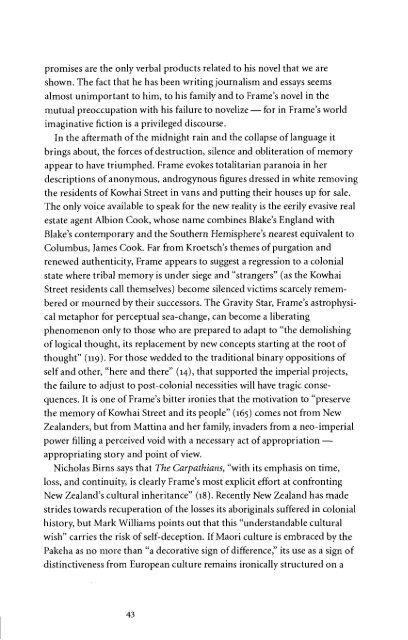The Carpathians - University of British Columbia
The Carpathians - University of British Columbia
The Carpathians - University of British Columbia
You also want an ePaper? Increase the reach of your titles
YUMPU automatically turns print PDFs into web optimized ePapers that Google loves.
promises are the only verbal products related to his novel that we are<br />
shown. <strong>The</strong> fact that he has been writing journalism and essays seems<br />
almost unimportant to him, to his family and to Frame's novel in the<br />
mutual preoccupation with his failure to novelize — for in Frame's world<br />
imaginative fiction is a privileged discourse.<br />
In the aftermath <strong>of</strong> the midnight rain and the collapse <strong>of</strong> language it<br />
brings about, the forces <strong>of</strong> destruction, silence and obliteration <strong>of</strong> memory<br />
appear to have triumphed. Frame evokes totalitarian paranoia in her<br />
descriptions <strong>of</strong> anonymous, androgynous figures dressed in white removing<br />
the residents <strong>of</strong> Kowhai Street in vans and putting their houses up for sale.<br />
<strong>The</strong> only voice available to speak for the new reality is the eerily evasive real<br />
estate agent Albion Cook, whose name combines Blake's England with<br />
Blake's contemporary and the Southern Hemisphere's nearest equivalent to<br />
Columbus, James Cook. Far from Kroetsch's themes <strong>of</strong> purgation and<br />
renewed authenticity, Frame appears to suggest a regression to a colonial<br />
state where tribal memory is under siege and "strangers" (as the Kowhai<br />
Street residents call themselves) become silenced victims scarcely remembered<br />
or mourned by their successors. <strong>The</strong> Gravity Star, Frame's astrophysical<br />
metaphor for perceptual sea-change, can become a liberating<br />
phenomenon only to those who are prepared to adapt to "the demolishing<br />
<strong>of</strong> logical thought, its replacement by new concepts starting at the root <strong>of</strong><br />
thought" (119). For those wedded to the traditional binary oppositions <strong>of</strong><br />
self and other, "here and there" (14), that supported the imperial projects,<br />
the failure to adjust to post-colonial necessities will have tragic consequences.<br />
It is one <strong>of</strong> Frame's bitter ironies that the motivation to "preserve<br />
the memory <strong>of</strong> Kowhai Street and its people" (165) comes not from New<br />
Zealanders, but from Mattina and her family, invaders from a neo-imperial<br />
power filling a perceived void with a necessary act <strong>of</strong> appropriation —<br />
appropriating story and point <strong>of</strong> view.<br />
Nicholas Birns says that <strong>The</strong> <strong>Carpathians</strong>, "with its emphasis on time,<br />
loss, and continuity, is clearly Frame's most explicit effort at confronting<br />
New Zealand's cultural inheritance" (18). Recently New Zealand has made<br />
strides towards recuperation <strong>of</strong> the losses its aboriginals suffered in colonial<br />
history, but Mark Williams points out that this "understandable cultural<br />
wish" carries the risk <strong>of</strong> self-deception. If Maori culture is embraced by the<br />
Pakeha as no more than "a decorative sign <strong>of</strong> difference," its use as a sign <strong>of</strong><br />
distinctiveness from European culture remains ironically structured on a

















